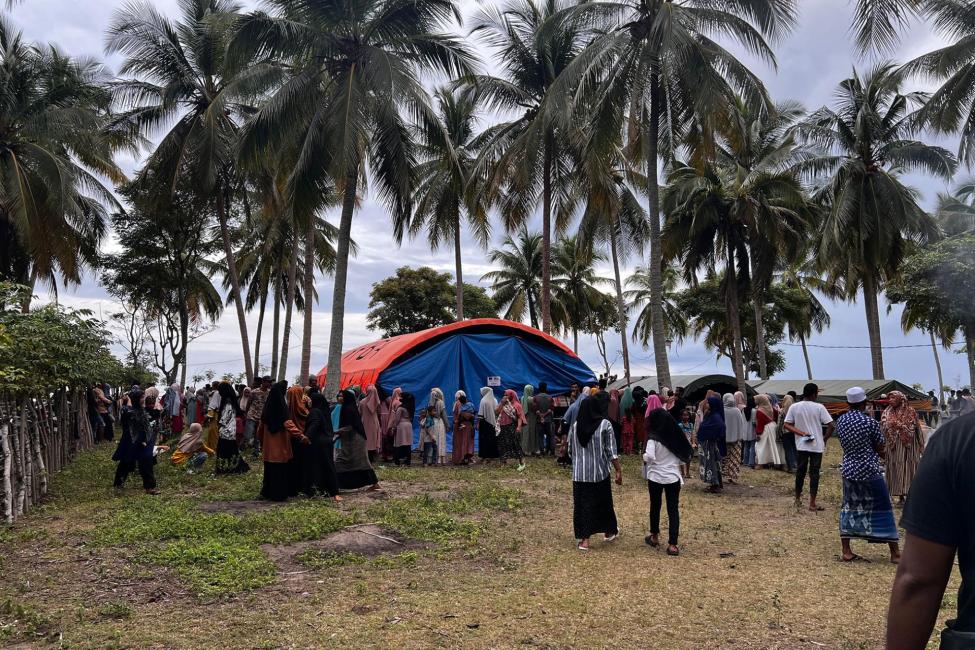-
Who we are
WHO WE AREThe International Organization for Migration (IOM) is part of the United Nations System as the leading inter-governmental organization promoting since 1951 humane and orderly migration for the benefit of all, with 175 member states and a presence in over 100 countries. IOM joined the United Nations system in September 2016.
About
About
IOM Global
IOM Global
-
Our Work
Our WorkAs the leading inter-governmental organization promoting humane and orderly migration, IOM plays a key role to support the achievement of the 2030 Agenda through different areas of intervention that connect both humanitarian assistance and sustainable development.
Cross-cutting (Global)
Cross-cutting (Global)
- Data and Resources
- Take Action
- 2030 Agenda
IOM Calls for Urgent Investment in Building Resilience and Adaptation to Future Disasters
Geneva – The recent launch of the Intergovernmental Panel on Climate Change’s (IPCC) Sixth Assessment Report and the United Nations Office for Disaster Risk Reduction’s (UNDRR) Global Assessment Report on Disaster Risk Reduction reinforce the growing body of evidence demonstrating the profound impacts that climate change is having on human mobility.
In 2021, from over 40 million new displacements, nearly 31 million people around the world were displaced by disasters. The Global Assessment Report predicts that by 2030, 560 disasters will take place annually – more than 1.5 disasters per day. UNDRR warns of a 30 percent increase in droughts and a tripling in the number of extreme temperature events. Disasters will cost low- and lower middle-income countries as much as 10 times what they will cost high- and upper middle-income countries. The Asia-Pacific regional will bear the brunt of economic losses.
“Disasters have now become a leading cause of forced displacement globally, with the region hosting this year’s Global Platform – Asia and the Pacific – experiencing the majority of these new displacements,” states António Vitorino, the International Organization for Migration’s (IOM) Director General. “Reducing disaster risk is not only one of IOM’s key institutional priorities but a global governance challenge that requires greater investment, attention and most importantly, concerted action.”
The seventh session of the Global Platform for Disaster Risk Reduction (GP2022) taking take place in Bali, Indonesia, marks the half-way point of the Sendai Framework for Disaster Risk Reduction implementation. IOM believes that GP2022 will serve as positive momentum for governments, DRR stakeholders and the UN system to reconfirm and advance their commitments.
UNDRR's Global Assessment Report underlines that as the growing intensity of natural hazards and more frequent disasters becomes the norm, it will be essential to avoid and mitigate the impact of disasters on our societies.
IOM is committed to translating the mobility dimensions of reducing disaster risk into concrete actions to ensure the safety and protection of migrants and displaced persons everywhere. IOM calls on all governments and parties to adopt the IPCC’s vision to move from climate risk to climate resilient development in order to address disaster risk reduction in the face of climate change.
The Global Compact for Safe, Orderly and Regular Migration (GCM) contains several intergovernmental commitments relating to migration in the context of climate change, aimed at minimizing the adverse drivers that compel people to move and at enhancing the availability of pathways for regular migration.
IOM is currently implementing over 250 Risk Reduction and Climate Change Adaption-related projects in some of the world’s gravest humanitarian emergencies including Ethiopia, Afghanistan, Bangladesh, the Democratic Republic of the Congo, Sudan, Mozambique, South Sudan and Nigeria.
The Organization views partnerships and community participation and engagement as essential to reducing risk. In the framework of government-led, multi-stakeholder partnerships, such as the Migrants in Countries in Crisis (MICIC) Initiative and the Platform on Disaster Displacement (PDD). Simultaneously IOM and UNDP are the global co-chairs of the Capacity for Disaster Reduction Initiative (CADRI) which has supported more than 30 countries to establish of DRR coordination mechanisms and associated policy and systems.
IOM’s responses to climate induced migration are holistic, inclusive of prevention-preparedness, response, early recovery and resilience building, and the reintegration of returned migrants.
More information on the Global Platform can be found here: https://globalplatform.undrr.org/
For more information, please contact
Nicholas Bishop, Email: nbishop@iom.int
Kennedy Omondi, Email: kokoth@iom.int

